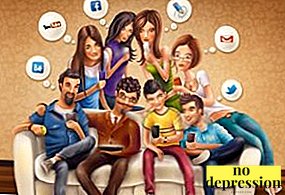Do you always keep your phone with you in sight, so as not to miss an important message?
You can hours "stick" Vkontakte just reading the news feed? Then this article is for you.
Psychology of online communication

We live in century of unprecedented development of IT-technologiesscience advances by leaps and bounds, with each day opening up more and more opportunities for man.
More recently, no one could have imagined that communication with people can be so simple.
After all, what could be simpler than sending a message in a vibera to a friend who is abroad or to a mother who lives in a village and get an answer instantly? But any medal, as usual, has two sides. Here is about the second, called social addiction, we'll talk.
There is evidence that a modern person spends an average of 5 years and 4 months on social networks. For comparison: food for 3 years and 5 months.
At the same time, social networks often spoil the mood and coolly undermine self-esteem. Looking through the news feed of more successful acquaintances we willy-nilly compare yourself with them.
From the side of someone else's life seems cloudless bright carnival, filled with interesting events, travel and other pleasures of life. While you have been following the second year without vacation, follow the beaten track "work-home-work."

But do not forget that the page is online often just a beautiful picture, bright wrapper, behind which is emptiness.
After all, few people want to share their problems and troubles with the outside world, everyone wants, if not to be, then to appear successful, loved, happy. Remember not always everything is as it seems.
How do social networks affect a person?
Dependence on social networks is the same dependence as narcotic, play, alcohol etc. What is addiction in general? First of all, the limitations of a person with something, his weakness.
An addicted person becomes accustomed to seeing life from his own particular angle, which binds himself very much and, as a result, his personal meager set of values is formed.
For example, how does a person with alcohol addiction see the world? As a rule, for him there is only one joy in life, for the sake of which he lives, works (he needs to earn money for alcohol), for the sake of which he happily goes home in the evening.

All other things he does not notice, or they are secondary to him. And so with any addiction.
As for social networks directly. Here addiction does not come immediately, there is a gradual addiction.
First, you enter your account once a day, after a week three, and after a month, perhaps several times an hour. Even to the detriment of their daily affairs.
Essentially social networks Dipping us in another, virtual life. Life where all beautiful, successful, wealthy.
Where can you get away from the problems for a while, feel and be a part of it? bright successful society. Where it is possible and to dream a little bit, to show oneself better than it actually is.
After all, a former classmate who lives, say, in Minsk or somewhere else, will not be able to check if this is really your Mercedes or you just took a photo on the background of someone else’s car, and a former classmate who has not seen you for 15 years will not understand Do you look so good or is it a photoshop.
Unfortunately, a return from social life to reality can be even more painful. After all, not everyone is so bright and interesting here, and you yourself are not exactly the same.
As a rule, susceptibility to dependence on social networks is observed more often. people are lonely, closed, those who have problems with communication in real life, as well as people who do not have any hobbies, interesting activities that can distract from the Internet.
But children and adolescents are the most dependent.
Signs of dependence

What is interesting, few can recognize the dependence specifically at home.
And in vain. The first important step to solving any problem is the awareness of its presence.
So, what can be considered signs of an emerging dependence on social networks?
- The first and most obvious sign of dependence - you all free (and even not free) time spend on the network. You are all the time online, even the morning you do not start with charging / a cup of coffee / smiles, but by viewing the news feed in social networks.
- Second sign - the appearance in your colloquial speech of words, typical patterned jokes from the Internet (your face, when ..., yazhemat, etc.) ...
Even worse, if you begin to replace the usual everyday words with the Internet abbreviations: pref, thank you, etc.
- Feature number three - your photo album is growing rapidly. You almost daily post the same type of selfie in everyday situations: at work, at home, at the institute. Well, either it can be photos of your legs, hands, food and other photos that do not carry a special semantic value.
- Sign Four - endless "sitting" in the networks just like that. That is, you do not correspond with anyone, do not discuss anything, but simply look at someone's photos, read various, often meaningless, posts.
- Sign Five. Imagine that you are going to go to rest. What first of all do you check at a new temporary place of deployment? Interesting places for tourists? Tours? Or the presence of Wi-Fi in the hotel? If the latter, then I have bad news for you.
- And finally sixth symptom - the lack of Internet causes you to panic. You feel lonely, you lack something, you constantly think about who could write to you what could have happened during the absence of the Internet. Some develop a sense of unwarranted anxiety.

Familiar? If you find yourself in at least two signs - it's time to take on yourself and nip this rather destructive addiction in the bud.
What to do, you ask?
How to get rid?

How to stop surfing the internet? How to stop being dependent on social networks:
- The most seemingly simple way to deal with addiction is to renouncement. But it's just in words. Sometimes it is very difficult to limit yourself in something, for some it is almost impossible. Then to help such people come specially designed programs that help organize time and spend less on the Internet. Specially designed programs block all social networks for a while, preventing them from being distracted from work and thereby adjusting to a person a specific schedule. Very convenient and efficient.
- The next, also very effective way to combat addiction - the most rigid and tight daily routine. When you realize that there is still a lot of things to do, sitting in social networks is no longer so much fun.
And the realization that you have done a lot of work during the day will unwittingly raise your self-esteem and inspire further accomplishments.
- You can also try make a list of your future achievements, to which you can come only by abandoning the permanent "sitting" on the Internet. Learning a language, playing sports, dancing, visiting theaters, museums, and just reading a good book.
- Why not translate all your virtual conversations and connections into real life? After all, it is much more interesting to communicate with a living person, watching his reaction and living emotions than with a virtual exchange of smiles.
- Practice the obligatory day "offline". Choose yourself at least one day a week / two weeks / month, when you completely refuse the Internet. No correspondence, no video, no email. Wonderful helps to distract and be alone with yourself.
- Travel more. This is not only a way to learn more, see, distract, but also a chance to meet new people. Real.
- While working switch to silent mode. Often, it is the sounds of alerts that distract from work and force you to go to your page again and again.
- Find a hobby for everyone. That occupation, which will distract you from everything in the world, including from the Internet

If all of the above tips do not help, then it may be worth considering to remove your pages from social networks.
Even the word "network" says that it is an absorber of free time, mesh that draws into the abyss.
The method, of course, is cardinal, but, as they say, “in love and in war ...”. And here it is war, the war for their free time and mental state.
Expert advice
And what do psychologists say about this? Are there any psychological techniques that help in the fight against addiction?

So to all of the above Experts say it will help:
- healthy 8-hour sleep;
- timer set to monitor the presence on the Internet;
- confidence that the addiction can be overcome without any doubt;
- daily walks in the fresh air and live communication at least 2-3 hours;
- food, sleep, hygiene daily at the same time;
- warm up every 15 minutes at the computer.
How to wean your neighbor?
They figured out with themselves, but what if some of your loved ones are not affected by this dependency? Husband, wife or even a child?
Tips are similar. A child needs to be carried away with something, it is possible to write down to some circle of interests (first, of course, asking if he would be interested, otherwise the result could be even worse).
It is also necessary to monitor the social activity of the child and, if possible, limit it.
Well, in the end, to communicate more, maybe your baby just doesn't have enough attention. If absolutely nothing helps, you should contact a psychologist.

As for other loved ones, they need to to pay more attentionin fact, as we remember, they dip into the social networks in order to avoid problems in real life.
Maybe your husband has problems at work?
Maybe mom feels bad, and you are completely not interested in her health?
In any case, the first stage of solving all kinds of problems is an honest, sincere conversation. Real conversation.
Of course, social networks are not a complete evil, but a great opportunity to establish contacts between people, a great way to get acquainted with the subsequent creation of a family (everyone will have at least one happy couple among acquaintances created by means of dating on the Internet), for someone a good platform for developing your own business.
And I by no means urge to completely abandon this type of communication. Just remember that everything is good in moderation.
All interesting life and useful, fruitful pastime on the Internet!
A clinical psychologist will tell the reasons why a person can not part with the Internet? and how to solve them:



